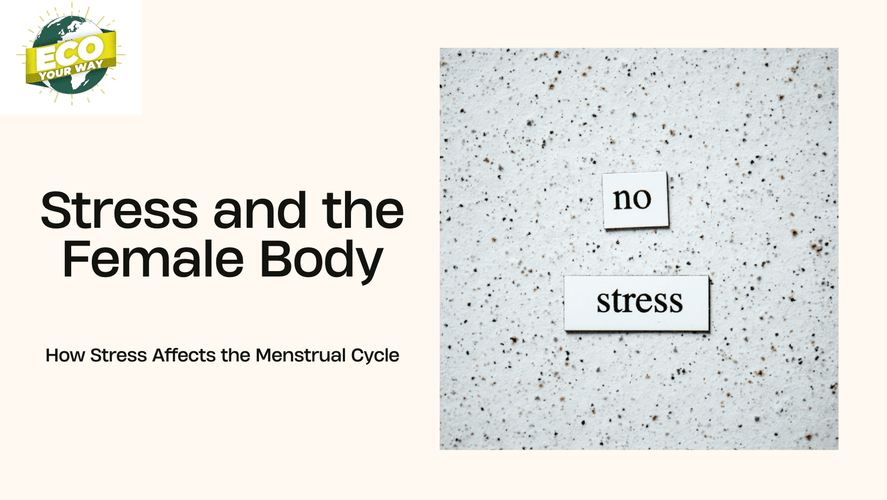Stress and the Female Body: How Stress Affects the Menstrual Cycle
Dec 1st 2024
Stress is a natural part of life, but when it becomes chronic, it can significantly impact the female body. One of the most common and concerning ways that stress affects women is through its impact on menstruation and reproductive health. Understanding how stress affects the menstrual cycle and why stress affects women differently is crucial for maintaining overall health. In this blog, we’ll explore how stress affects periods, the link between stress and the female body, and the best ways to manage stress for optimal hormonal balance and menstrual health.
The Link Between Stress and the Menstrual Cycle
The menstrual cycle is controlled by a complex hormonal balance. When stress enters the picture, it can disrupt this balance, leading to a range of menstrual issues. Stress and the female body are deeply interconnected, and how stress affects the menstrual cycle can be seen in many forms, including irregular periods, painful menstruation, and changes in cycle length.
When the body perceives stress, it activates the "fight or flight" response, which releases stress hormones like cortisol and adrenaline. While these hormones are helpful in the short term, chronic stress leads to prolonged elevation of cortisol, which can interfere with the hormonal balance necessary for a healthy menstrual cycle.
How Does Stress Affect Periods?
The question of how does stress affect periods is essential for understanding the impact of stress on reproductive health. Chronic stress can lead to hormonal imbalances that directly affect menstruation. High cortisol levels interfere with the production of estrogen and progesterone, hormones crucial for regulating the menstrual cycle.
- Cortisol and Menstruation Cortisol, known as the "stress hormone," plays a central role in the body's response to stress. When cortisol levels remain elevated due to chronic stress, it can disrupt the hormonal signals that regulate the menstrual cycle. This disruption may lead to delayed, irregular, or missed periods. It can also intensify the symptoms of conditions like premenstrual syndrome (PMS) and premenstrual dysphoric disorder (PMDD).
- Estrogen and Progesterone Imbalance Elevated cortisol levels can suppress estrogen production, affecting the timing and regularity of menstruation. Additionally, cortisol can reduce progesterone levels, which are necessary for maintaining the second half of the menstrual cycle, after ovulation. A lack of sufficient progesterone can result in irregular cycles, heavier periods, or even anovulation (lack of ovulation).
Why Does Stress Affect Women Differently?
Why does stress affect women more intensely than men? There are several reasons for this. First, women’s hormonal systems are particularly sensitive to stress. Stress can disrupt the delicate balance of estrogen and progesterone, leading to a range of menstrual issues. Second, women are more likely to experience stress-related conditions like polycystic ovary syndrome (PCOS), endometriosis, and uterine fibroids, all of which are exacerbated by stress. Lastly, lifestyle factors such as multitasking, societal pressures, and hormonal fluctuations can make women more vulnerable to stress and its impact on reproductive health.
Stress and Menstrual Disorders
Stress is a known trigger for various menstrual disorders, making it essential for women to manage stress effectively. Here’s a closer look at some common conditions impacted by menstruation and stress:
- Polycystic Ovary Syndrome (PCOS) Women with PCOS often experience hormonal imbalances that cause irregular periods. Stress can worsen the symptoms of PCOS by increasing cortisol levels, which may exacerbate insulin resistance and lead to more severe menstrual disruptions.
- Endometriosis Endometriosis is a condition in which tissue similar to the uterine lining grows outside the uterus, causing pain and heavy periods. Chronic stress can worsen these symptoms by increasing pain sensitivity and inflammation, making menstruation even more difficult to endure.
- Uterine Fibroids Uterine fibroids are noncancerous tumors that can cause heavy periods, pelvic pain, and complications in pregnancy. Stress can contribute to the growth of fibroids by elevating cortisol levels, leading to further hormonal imbalances that worsen menstrual symptoms.
- Premenstrual Syndrome (PMS) and Premenstrual Dysphoric Disorder (PMDD)Menstruation and stress are closely linked when it comes to PMS. Women who experience high stress levels tend to have more severe PMS symptoms, including irritability, fatigue, mood swings, and bloating. For women with PMDD, stress can amplify these symptoms, making them more debilitating.
How Does Stress Affect Ovulation and Fertility?
Another crucial aspect of how stress affects the menstrual cycle is its impact on ovulation. Chronic stress can interfere with the production of key hormones like luteinizing hormone (LH) and follicle-stimulating hormone (FSH), both of which are essential for ovulation. Without proper ovulation, periods can become irregular or cease altogether, which can significantly affect fertility.
Hypothalamic Amenorrhea (HA) and Stress
Hypothalamic Amenorrhea (HA) is a condition in which menstruation stops due to stress, excessive exercise, or low body weight. The hypothalamus, a part of the brain that regulates hormone production, can stop signaling the release of gonadotropin-releasing hormone (GnRH) when stress levels are too high. This results in the cessation of ovulation and menstruation. Stress and the female body are intricately connected in the case of HA, as the body perceives extreme stress as a threat to survival, halting reproduction.
Recognizing When Stress Affects Your Period
It’s essential to recognize the signs that stress is affecting your period, as it can indicate the need for changes in lifestyle or stress management. Signs include:
- Irregular periods: Periods that come too early, too late, or stop altogether.
- Heavy or painful periods: Stress can increase menstrual cramps and bleeding intensity.
- Changes in cycle length: Stress can either shorten or lengthen your menstrual cycle.
- PMS: Elevated stress can worsen PMS symptoms like mood swings and fatigue.
- Amenorrhea: Severe stress can lead to a complete absence of periods.
When to Seek Help
If you notice persistent changes in your menstrual cycle that seem linked to stress, or if your period stops entirely, it’s important to consult a healthcare provider. A healthcare professional can help determine whether stress is the cause of your menstrual irregularities or if there are other underlying conditions at play.
Holistic Ways to Manage Stress and Support Menstrual Health
Effective stress management is crucial for maintaining hormonal balance and reproductive health. Here are some holistic ways to reduce stress and improve menstrual health:
- Mindfulness and Meditation Mindfulness practices like deep breathing and meditation can help lower cortisol levels and improve emotional well-being, promoting hormonal balance.
- Regular Physical Activity Exercise reduces stress, boosts mood, and supports healthy hormone production. A balanced workout routine—like yoga, swimming, or walking—can help regulate the menstrual cycle.
- Balanced Nutrition A healthy diet plays a significant role in managing stress and supporting hormonal health. Incorporating foods that reduce cortisol levels, like magnesium-rich leafy greens and nuts, can support both stress management and menstrual health.
- Herbal Remedies Adaptogenic herbs such as ashwagandha, rhodiola, and holy basil can help support the body’s response to stress. Always consult with a healthcare provider before starting any new supplements.
- Quality Sleep Adequate sleep is essential for managing stress. Aim for 7-9 hours of restful sleep each night to help reduce cortisol levels and support the menstrual cycle.
- Acupuncture Acupuncture has been shown to reduce stress and help regulate the menstrual cycle by improving blood flow and balancing hormones.
Final Thoughts on Stress and Menstruation
Stress and the female body are closely linked, and how stress affects periods can have significant implications for reproductive health. Chronic stress can cause irregular periods, painful menstruation, and conditions like PCOS and endometriosis. Recognizing the signs that stress is affecting your menstrual cycle and managing it through lifestyle changes and holistic practices is essential for maintaining hormonal balance and reproductive health.
If you are struggling with stress-related menstrual problems, it’s important to seek medical advice and explore effective stress management strategies. By prioritizing self-care, reducing stress, and seeking professional help, women can maintain a healthy menstrual cycle and improve their overall well-being.
Conclusion
The impact of stress and the female body on menstrual health cannot be overstated. Understanding how stress affects the menstrual cycle, the reasons why stress affects women, and the best ways to manage stress can help women maintain better hormonal balance and menstrual health. By adopting holistic stress-reduction techniques and seeking appropriate medical guidance, women can manage the effects of stress on their menstrual cycle and overall reproductive health.

